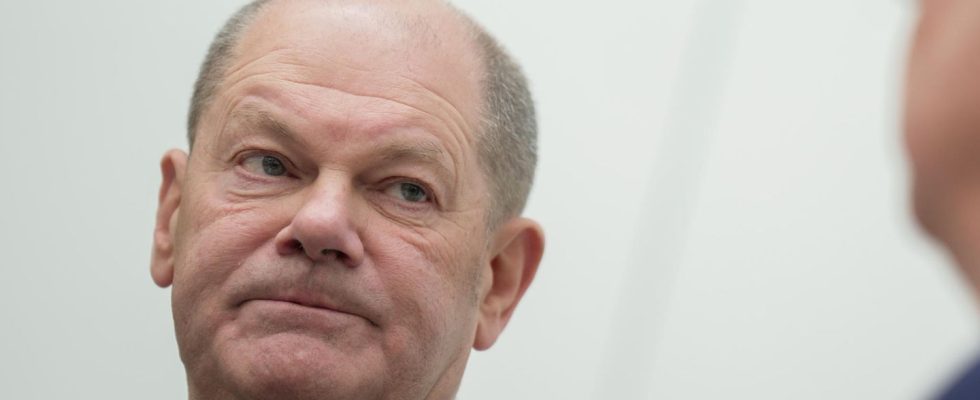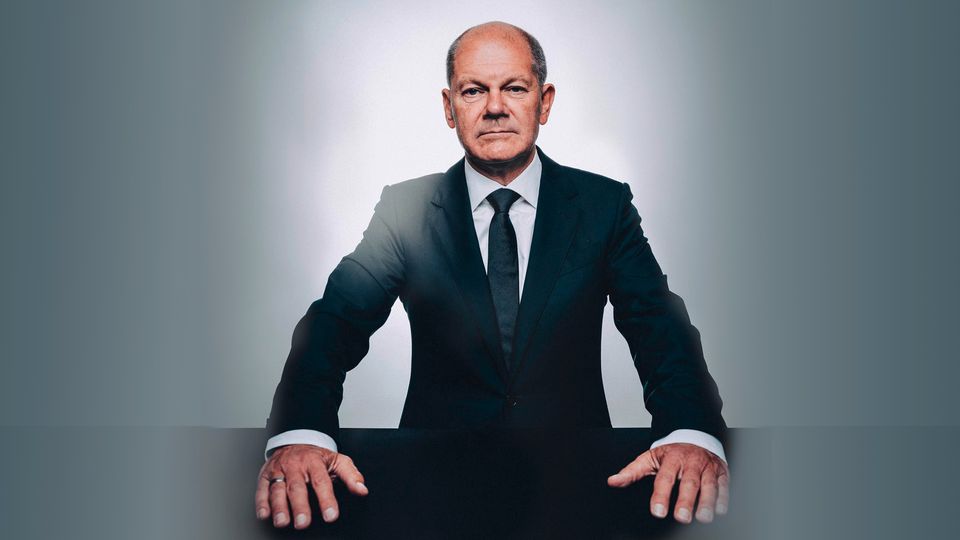For months, the Chancellor stayed out of the debate about delivering Taurus missiles to Ukraine. Now he is breaking his silence – and turning the coalition partners against him.
Chancellor Olaf Scholz (SPD) has clearly rejected the delivery of Taurus cruise missiles to Ukraine, citing the risk of Germany becoming involved in the war. “German soldiers must not be linked to the goals that this system achieves at any point or place. Not even in Germany,” said Scholz on Monday at the DPA editorial conference in chief. From his point of view, the use of Taurus would only be possible with the participation of his own German personnel. That is why this is not currently on the agenda.
“This clarity is also necessary,” emphasized Scholz around two years after Russia’s attack on Ukraine. “I’m surprised that some people aren’t moved at all, that they don’t even think about whether what we’re doing could, in a sense, lead to participation in the war.”
CDU politician Röttgen calls the Chancellor’s reasoning “infamous”
The Chancellor immediately received opposition from the ranks of his own coalition. The deputy parliamentary group leader of the Green Party in the Bundestag, Agnieszka Brugger, wrote on .” The FDP defense expert Marie-Agnes Strack-Zimmermann wrote on
Criticism also came from the Union: CDU foreign policy expert Norbert Röttgen wrote on Taurus is not a miracle weapon. “But it is strategically important because it allows the Ukrainians to destroy positions in the occupied territories without moving close to the front line. Taurus would thus protect soldiers and civilians!”
Kremlin within Taurus range from Ukraine
Taurus is a precision weapon that can hit targets 500 kilometers away. The Kremlin in Moscow, for example, is within this radius from the Russian-Ukrainian border. The Ukrainian government had already asked for the delivery of cruise missiles in May last year in order to be able to hit the Russian supply lines far behind the front. The Union is also calling for release, and the Chancellor’s coalition partners, the Greens and the FDP, are also mostly in favor of it. However, a Bundestag resolution expressly calling for the delivery of Taurus failed last week.
Scholz had already decided in October not to send the Taurus rockets to Ukraine for the time being, but never publicly explained the reasons in detail. Behind his skepticism lies the fear that Russian territory could be hit and Germany could be drawn into the war. The French and British are trying to prevent this by programming the Scalp and Storm Shadow cruise missiles they delivered to Ukraine themselves. There is speculation that at least Great Britain has personnel stationed in Ukraine for this purpose. This was never officially confirmed.
Scholz does not want any German involvement in the control of Taurus
“What the British and French are doing in terms of target control and the accompaniment of target control cannot be done in Germany,” emphasized Scholz. “Everyone who has dealt with this system knows that.” For the Chancellor, involving German soldiers in controlling the Taurus missiles is out of the question, regardless of whether they do so from Ukraine or Germany. “What other countries do, which have different traditions and different constitutional institutions, is something that we cannot do in the same way.”
Scholz went on to say that he was “very irritated” by the “missing balance” between what was really needed now and the debate about this one system. “What Ukraine is missing is ammunition in all possible lengths and distances, but not crucially this thing from Germany,” he said when asked about the Taurus. Germany has made great efforts to expand supplies of ammunition. “We, as Europe as a whole and the global community as a whole, are not yet at the scale that is urgently needed.”
Scholz wants to prevent “war between Russia and NATO”.
Scholz explained that there is a principle that he has said from the beginning – and that cannot be repeated often enough: “We will prevent the war that Russia has started against Ukraine from escalating into a war between Russia and NATO are coming. It is very clear that there will be no German soldiers on Ukrainian land. And I also stand for that: that there is no involvement of our country and our country’s military structures in this war. ” This is a responsibility that the government and he as Chancellor have to the citizens.
The “talk” that there is hesitation is part of the problem in Germany, said Scholz. “A lot of people watch TV in the evenings and hope that the Chancellor will keep his nerve,” said Scholz. There are people who are discussing what can be delivered next. But there is no debate about an opposing opinion. “That’s a problem,” said Scholz. A third of citizens are skeptical as to whether Germany is doing too much. In Scholz’s opinion, it would help if this “were the subject of a debate at some point.”
This would also be needed in order to be able to maintain support if the war lasted a long time. “We have to hold out for a long time. In a democracy and in a country that feels committed to freedom, this is only possible if the majority of citizens are convinced that it is right.”


